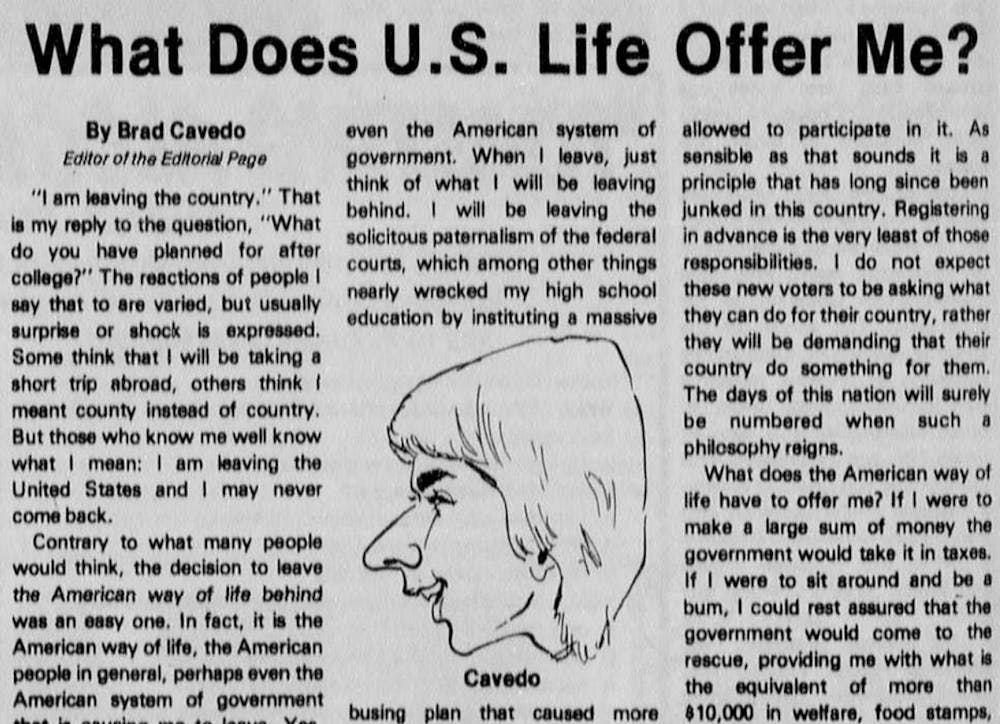An opinion piece published in The Collegian in 1977 has resurfaced after it was discovered that the piece — which criticized desegregation busing and instant voter registration, among other aspects of the U.S. government at the time — was written by Bradley Cavedo, the Richmond Circuit Court judge who recently ruled to block the removal of Confederate statues.
Cavedo graduated as an undergraduate from the University of Richmond in 1977 and from the T.C. Williams School of Law in 1983, wrote vice president of media and public relations Cynthia Price in an email to The Collegian.
Cavedo was editor of the editorial page at the time he wrote the April 21, 1977 article, titled "What Does U.S. Life Offer Me?"
The article began with Cavedo declaring that he planned to leave the U.S. after college. He critiqued the busing plan of his former school, Thomas Jefferson High School, which was used to integrate schools.
“I will be leaving the solicitous paternalism of the federal courts, which among other things nearly wrecked my high school education by instituting a massive busing plan that caused more upheaval in my school and my life than most people could imagine,” Cavedo wrote.
In the same April 21, 1977 issue, another article titled “Senator Byrd To Speak” detailed plans for Sen. Harry Byrd to speak at the UR Law Review’s annual spring banquet on April 22, 1977. Byrd was a leader of Massive Resistance, which aimed to prevent the racial integration of schools.
In Cavedo's opinion piece, he also criticized the Federal Trade Commission; Food and Drug Administration; Environmental Protection Agency; Department of Health, Education and Welfare; and Congress.
“Worse than [the aspects of government listed above] looming like a vulture over a dying animal, is President Carter's instant voter registration plan,” Cavedo wrote. “This scheme will allow the parasites of this nation to become the dominating force in politics.”
He concluded the article by stating that he needed to find a country better suited for him to live.
“I am not the irrational nut one may think I am in reading this,” Cavedo wrote. “I am only a realist who sees a nation sinking fast, and there is virtually no hope for a recovery. The reason is the reluctance of the American people to give a damn.”
Cavedo now serves on the 13th Judicial Circuit Court of Virginia. On June 8, he granted a temporary injunction to block the removal of the Monument Avenue memorial to Confederate Gen. Robert E. Lee after a descendant of the family that deeded the property for the monument, William Gregory, filed a lawsuit against the monument’s removal. Cavedo extended this injunction indefinitely on June 18.
On July 1, Cavedo disqualified himself from ruling on a proposed consolidation of the Gregory case and a second lawsuit, which was filed by six residents of the Monument Avenue Historic District who claimed that the removal of the Lee monument would have an adverse economic impact.
Enjoy what you're reading?
Signup for our newsletter
On July 9, Cavedo blocked the removal of the remaining Confederate statues in Richmond for 60 days, after an anonymous Virginia resident claimed the July 1 removal of Confederate statutes ordered by Richmond Mayor Levar Stoney violated state law. On July 16, Cavedo recused himself from the Gregory case, citing that he did so because his home is located in the historic district.
Cavedo did not respond to The Collegian’s requests for comment.
Kenny Powers, UR ‘77 and the managing editor of The Collegian when Cavedo’s aforementioned opinion piece was published, said he did not remember there being any controversy or backlash about the article when it was published. Powers also said opinion articles had not often been discussed or approved by other editors before publishing.
“I didn’t even remember the editorial, and when I read [an] article on Facebook about it, I was kind of surprised,” Powers said. “I was like, ‘Wow, did we really publish that? I guess we did.’”
Powers shared an anecdote about when he, Cavedo and the other Collegian editors moved their belongings into The Collegian office in 1977.
“When we were moving in, [Cavedo] had a picture of Ronald Reagan hanging in his cubicle ... this was four years before Ronald Reagan was elected president,” Powers said. “But Ronald Reagan was Mr. Republican, you know … Right off the bat we knew: ‘Okay, who’s this guy with a picture of Ronald Reagan hanging in his cube? That’s kind of strange.’ But we knew, ‘Okay, yeah, this guy is hard-core Republican.’”
When Powers attended UR it was common to see Confederate flags around campus, he said.
“Just to give you an idea of what it was like, my freshman year the mascot for the Spiders was a spider in a Confederate uniform,” Powers said. “... We were a Baptist-affiliated school back then … I had more Black students in my high school senior class than we had in the entire University of Richmond.”
Thomas Stenzel, The Collegian’s editor-in-chief when Cavedo’s opinion piece was published, did not respond to The Collegian’s requests for comment.
Rising senior Jack Connelly said he came across a thread about Cavedo’s opinion piece on Twitter. Humans of UR, an Instagram account that posts submissions from UR students, staff and professors about their experiences at UR in an attempt to foster community, shared the Twitter thread Connelly came across after seeing him post about it on Instagram, Connelly said.
“I retweeted the thread and took a couple of screenshots of [the thread] and posted them on my Instagram story,” Connelly said. “And Humans of UR actually reached out to me and asked if they could share it to a larger audience on their page … I thought it was really great that they did think that was important and that they chose to share it.”
Connelly said he thought it was important for UR students to be aware of the actions of other Spiders, both current and alumni.
“The language that was used in that piece was really disheartening and disappointing to see come from our school because it was just so vile,” Connelly said. “And Richmond has a long history with a variety of different racist incidents and then also ingrained systemic racism that’s pretty pervasive in the university. While it was disappointing, it was, I guess, not unexpected.
“And so when we come across things like that, that happened at our school, I think it’s really important to make sure that we’re at least talking about it.”
The injunctions Cavedo made that prevent the removal of the Lee monument and the removal of any other Confederate monuments in Richmond for 60 days remain in place. A hearing for the Gregory case, which Cavedo no longer presides over, is scheduled to occur on July 23.
Contact managing editor Emma Davis at emma.davis@richmond.edu.
Support independent student media
You can make a tax-deductible donation by clicking the button below, which takes you to our secure PayPal account. The page is set up to receive contributions in whatever amount you designate. We look forward to using the money we raise to further our mission of providing honest and accurate information to students, faculty, staff, alumni and others in the general public.
Donate Now



